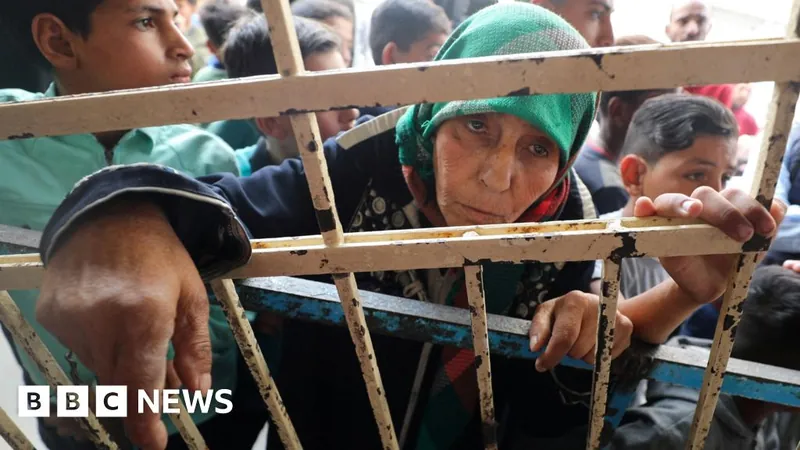
Gaza Faces Dire Humanitarian Crisis as Bakeries Close and Medications Run Dry Amid Ongoing Blockade
2025-04-02
Author: Jessica Wong
Gaza's Humanitarian Crisis Intensifies
In a shocking development, the Gaza Strip has entered a devastating humanitarian crisis as the Israeli blockade of the territory reaches its peak, marking one month of severe restrictions on the flow of goods. With bakeries supported by the United Nations forced to shut their doors, markets in Gaza have become barren, leaving the populace grappling with hunger and despair during what should have been a festive period for Eid al-Fitr.
“This was our worst Eid ever,” lamented Um Ali Hamad, a displaced resident from Beit Lahia. “We can barely find food to eat, let alone celebrate.” Reports indicate that staple goods, including fruits, vegetables, flour, and cooking oil, have become nearly impossible to procure, forcing many families to search for one meal a day. "There's nothing left for my three-month-old grandchild—no milk, no diapers," she added, highlighting the dire conditions facing families with young children.
Impact of the Blockade
The blockade, which Israel imposed on March 2 in response to Hamas's refusal to progress the terms of a ceasefire agreement, has effectively strangled the flow of humanitarian aid into Gaza. This crisis unfolds against the backdrop of a war that has already lasted almost 18 months, following escalated conflict that began with Hamas's attacks on southern Israel in early October 2023.
Aid agencies are actively calling on global leaders to pressure Israel into allowing crucial supplies—including food, medicine, and hygiene products—back into the region, emphasizing the country's legal obligations under international humanitarian law. "The situation is rapidly deteriorating, and critical supplies are being used up at an alarming rate," stated a spokesperson for the UN.
Healthcare Crisis in Gaza
Hospital facilities in Gaza are reaching a breaking point, with many experiencing severe shortages of medications such as antibiotics and pain relief for injured patients. The World Health Organization (WHO) reported that over half of the hospitals treating trauma patients are now essentially at capacity. “Doctors are forced to improvise with what little they have left. It's a heartbreaking situation,” said Dr. Mark Perlmutter, an American surgeon who recently worked in Gaza under these dire conditions. He described how a lack of basic tools for surgery had led him to use drill bits to treat injuries, underscoring the gravity of the crisis.
Economic Ramifications
As bakeries close, residents are confronted with skyrocketing prices on the black market. A 25kg bag of flour—a vital staple—has reportedly surged tenfold to about $135, leaving many unable to afford even basic necessities. "The closure of our bakeries is catastrophic; bread is our lifeline,” mourned Abu Alaa Jaffar, a grandfather observing the empty storefronts.
Warnings from UNRWA
The United Nations Relief and Works Agency (UNRWA), which provides assistance to Palestinian refugees, has warned that its resources are dwindling rapidly, with just a few days' worth of food left to distribute. UN officials decried claims by Israeli authorities that there is sufficient food in Gaza to last its population of two million, stating, “We are at the tail end of our supplies, and conditions will worsen dramatically without immediate intervention.”
Diplomatic Stalemate
Despite calls for a renewed ceasefire from Arab mediators and diplomatic efforts from nations like Egypt and the US, there are few signs of progress toward easing the blockade. Both parties appear entrenched in their positions, with Hamas continuing to demand the release of hostages in exchange for any concessions, further complicating the path to peace.
A Call for Urgent Action
As the Israeli military intensifies its operations, humanitarian needs in Gaza continue to escalate to alarming levels, with global organizations urging for immediate action to avert catastrophe. The eyes of the world remain fixed on this beleaguered region—will a critical solution emerge in time to save lives, or is the crisis set to deepen even further? Stay tuned as we continue to monitor this unfolding situation.




 Brasil (PT)
Brasil (PT)
 Canada (EN)
Canada (EN)
 Chile (ES)
Chile (ES)
 Česko (CS)
Česko (CS)
 대한민국 (KO)
대한민국 (KO)
 España (ES)
España (ES)
 France (FR)
France (FR)
 Hong Kong (EN)
Hong Kong (EN)
 Italia (IT)
Italia (IT)
 日本 (JA)
日本 (JA)
 Magyarország (HU)
Magyarország (HU)
 Norge (NO)
Norge (NO)
 Polska (PL)
Polska (PL)
 Schweiz (DE)
Schweiz (DE)
 Singapore (EN)
Singapore (EN)
 Sverige (SV)
Sverige (SV)
 Suomi (FI)
Suomi (FI)
 Türkiye (TR)
Türkiye (TR)
 الإمارات العربية المتحدة (AR)
الإمارات العربية المتحدة (AR)